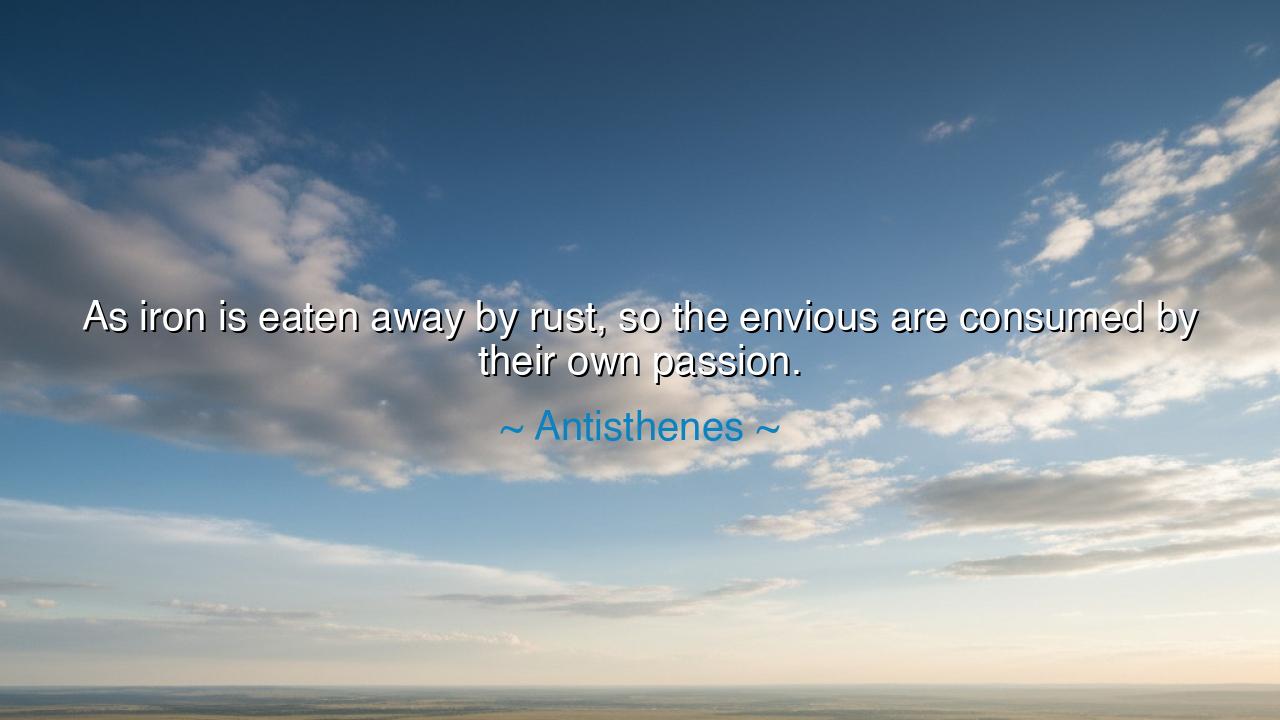
As iron is eaten away by rust, so the envious are consumed by






“As iron is eaten away by rust, so the envious are consumed by their own passion.” – Antisthenes
Hear these words, O child of the ages, for they come from the lips of Antisthenes, the disciple of Socrates and the father of the Cynic philosophers. He was a man who sought truth not in luxury or wealth, but in simplicity and strength of soul. His wisdom was forged like iron, hard and enduring, and from that wisdom he spoke this warning: “As iron is eaten away by rust, so the envious are consumed by their own passion.” What is rust but the slow, silent decay that comes not from without, but from within? So too does envy corrode the heart of man—not by the blows of others, but by his own ungoverned fire.
Envy is a quiet poison. It seeps into the spirit like rust upon steel—imperceptible at first, but relentless in its destruction. The envious man looks upon the good fortune of others and finds in it a wound. He cannot rejoice in another’s joy, for his heart feeds upon resentment. Yet as he fixates on what others possess, he forgets the strength and beauty within himself. Thus he grows weaker, corroded by comparison, until his soul—once sharp and bright—is dulled and broken. Antisthenes saw this not as mere moral failing, but as a kind of spiritual death, slow and self-inflicted.
Look to history, and you will see the truth of this ancient saying. Envy destroyed Cain, the firstborn of mankind, who lifted his hand against his brother Abel not out of need, but out of jealousy. In the green field where both offered sacrifice, one gave with a pure heart, the other with a restless spirit. When the heavens smiled upon Abel’s offering, Cain’s envy burned hotter than fire—and so he struck down his own blood. The curse that followed him was not the wrath of God alone, but the torment of his own heart, eaten by the rust of envy. From that day forward, envy has walked beside man like a shadow, whispering ruin into noble hearts.
Even the mighty have fallen to its power. Consider Napoleon Bonaparte, whose brilliance and ambition lifted him to the height of empires. Yet his envy of other rulers and nations drove him beyond wisdom into arrogance and overreach. His hunger to outshine all others became his undoing. Like rust upon iron, his own unbridled passion consumed the empire he had built. His downfall was not born of his enemies, but of the corrosion within—his inability to find peace with what he already possessed. Thus does history echo the philosopher’s warning: the envious perish not from without, but from within.
The lesson of Antisthenes is one of self-mastery. He teaches that envy cannot be conquered by indulgence, nor by punishment, but only by understanding. When we see another prosper, we must not say, “Why not I?” but rather, “What can I learn from them?” The wise man transforms envy into admiration, and admiration into action. The fool lets envy rot his spirit until he becomes his own enemy. Remember, no sword can cut iron as sharply as its own rust, and no external foe can destroy the envious man faster than his own bitterness.
So cleanse your heart daily as the smith polishes his blade. Guard your soul against the rust of envy with gratitude, humility, and purpose. When you feel the sting of comparison, turn it into inspiration; when jealousy stirs within you, let compassion quench its flame. Rejoice in the triumphs of others, for their light does not dim yours—it shows the path more clearly. In lifting others, you cleanse yourself of decay; in celebrating goodness, you strengthen your own.
Therefore, remember this eternal truth: the envious are consumed by their own passion, but the grateful endure like tempered steel. Let your soul remain bright and untarnished. Do not gaze upon what others have, but upon what you may yet become. For envy is decay, but virtue is strength; envy is rust, but wisdom is the fire that keeps iron pure. And he who keeps his heart free of envy shall shine forever, uncorroded by time or circumstance—a soul of living iron, steadfast and whole.






AAdministratorAdministrator
Welcome, honored guests. Please leave a comment, we will respond soon